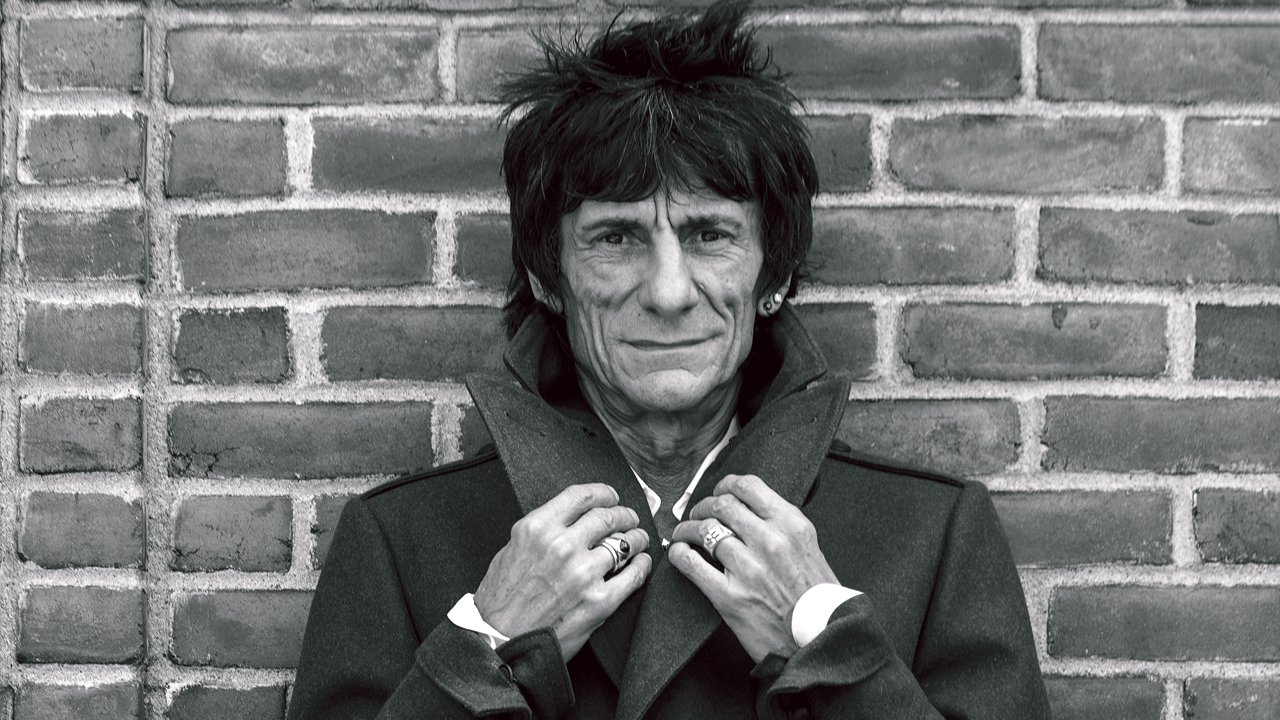Now, as the original 1965 text is reproduced, The Blues meets the Stones guitarist to hear about stealing Clapton’s girl, dodging bottles, changing Sharon Osbourne’s nappies and the madness of Keith Moon…
This must be the place. The ravishing receptionist. The metallic lips logo behind the front desk. The wealth. The taste. There is no mistaking the London production offices of The Rolling Stones. And here’s Ronnie Wood, crossing the room where he’s chain-smoked through three hours of interviews, like a crow emerging from the fog in an old Hammer horror film. He shakes hands, cracks a grin that gives him the look of a benevolent walnut and points at an object on the desk between us. “There it is,” he croaks, paternally./o:p
We’re looking at a small, brown, battered, leather-bound book. The sort of book you’d expect to find on the shelves of Dumbledore’s study. The sort of book you’d overlook, were it not for its intimate association with a Rolling Stone. This, then, is Wood’s original 1965 diary. Scrawled half a century ago by a 17-year-old nobody, it has recently been exhumed by a 68-year-old legend, annotated with notes and sketches and published at price points to suit prince and pauper. “I didn’t plan it this way,” admits Wood of How Can It Be? A Rock & Roll Diary. “Y’know, I never had a lock on it, but I’d never have thought of publishing it. But it’s a great idea, now that we are.”
To flip through Woody’s scribbles is to feel a flush of hot jealousy. If there was a better time and place to be young, drunk and in a rising R&B band than London town circa ’65, we’re not aware of it. Raised in the borough of Hillingdon – by a family he affectionately refers to as “water gypsies” – Wood says his parents gave him their blessing, of sorts, to throw himself into the club scene. “I never even started a day job. I went to a few interviews and I thought, ‘How do people do this?’ There was so much red tape to getting a job as a commercial artist. With music, I could just get in the van. My parents were okay with it. When I had long hair, my dad used to say, ‘You want to look like that, kid, that’s alright with me.’”/o:p
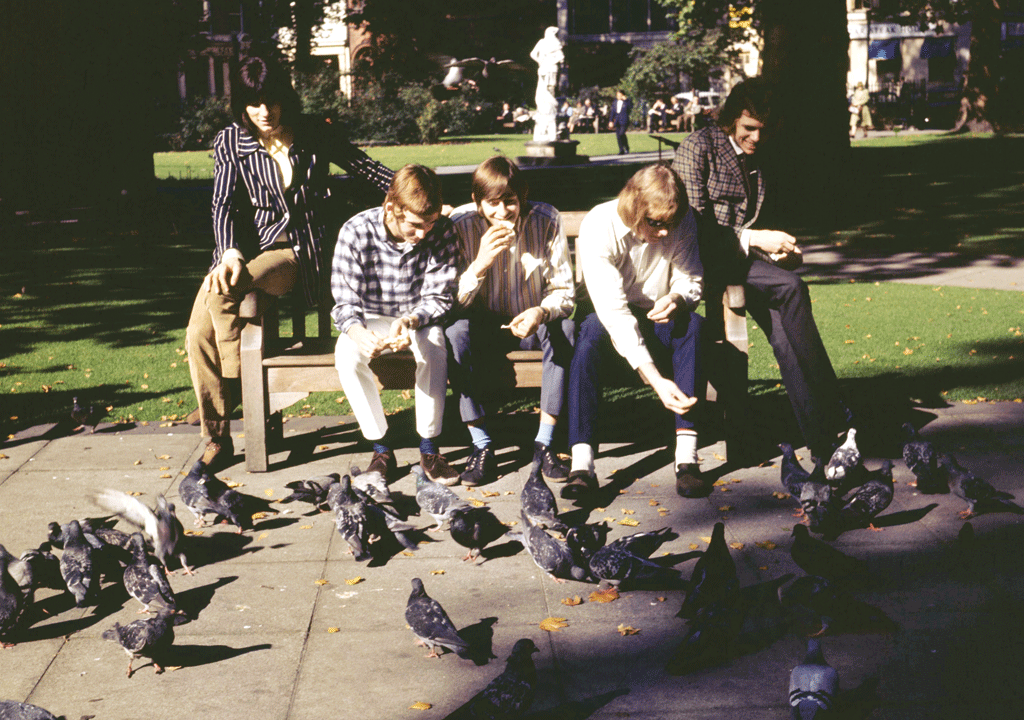
Above: a bunch of dirty Birds feed the pigeons.
The Beatles and Rolling Stones were out of the blocks by ’65 (“I didn’t get to see them that often,” notes the guitarist of his future employers. “They had broadened their horizons. But I always thought, that looks like a good job.”). As for Wood, he was a few rungs down the food chain. Before the Stones, before the Faces, even before The Creation, his gig was The Birds (not to be confused with the Californian folk janglers The Byrds, though most punters did).
The diary includes a reproduced poster from the era, proclaiming them ‘London’s Greatest R&B Band!’ Certainly, The Birds had some scorching cuts – their take on Holland- Dozier-Holland’s Leaving Here is the pick – but even Wood thinks that tagline is pushing it. “Well, that was the sales pitch,” he chuckles. “We were ‘London’s Most Dynamic Group!’ We were very much influenced by The Impressions and Temptations. Anything from that soul thing, right through to Chuck Berry, even The Beach Boys. And obviously, there was the bluesy influence of Howlin’ Wolf, Muddy Waters and Jimmy Reed. Like in my musical viewpoint today, it’s a little of this, a little of that.”
There’s a palpable sense of the British bands jockeying for position in Wood’s diary. He nods: “We were trying to live up to what The Who and the Stones were doing. The Who used to turn up to gigs shouting ‘We’re number one!’ And we’d be going, ‘Bastards!’ Then there were the halfway-houses like The Pretty Things, who we used to hang out with and find ourselves on bills with. But I would gauge how we were getting on by The Yardbirds.”
All the second-tier bands worked the same circuit. “The atmosphere in the clubs at that time was really special,” says Wood. “There used to be a little crowd of us, in Blaises, the Cromwellian and the Speakeasy. Musicians would meet up, talk about how their gigs had gone that evening. You’d know someone on the door, build a rapport with them and they’d get you in. Then there were low-ceilinged places like the Ealing Club and Crawdaddy, where people would swing from the rafters and the sweat would drip down from the ceiling. My brother Arthur used to call the Ealing Club the Moist Hoist.
“I was always a night bird,” he says of his nocturnal lifestyle, “ever since I was 12. My mum always used to say that when I was young, I’d go to bed at seven. After that, once I reached the teens, I was never in bed before four in the morning.”
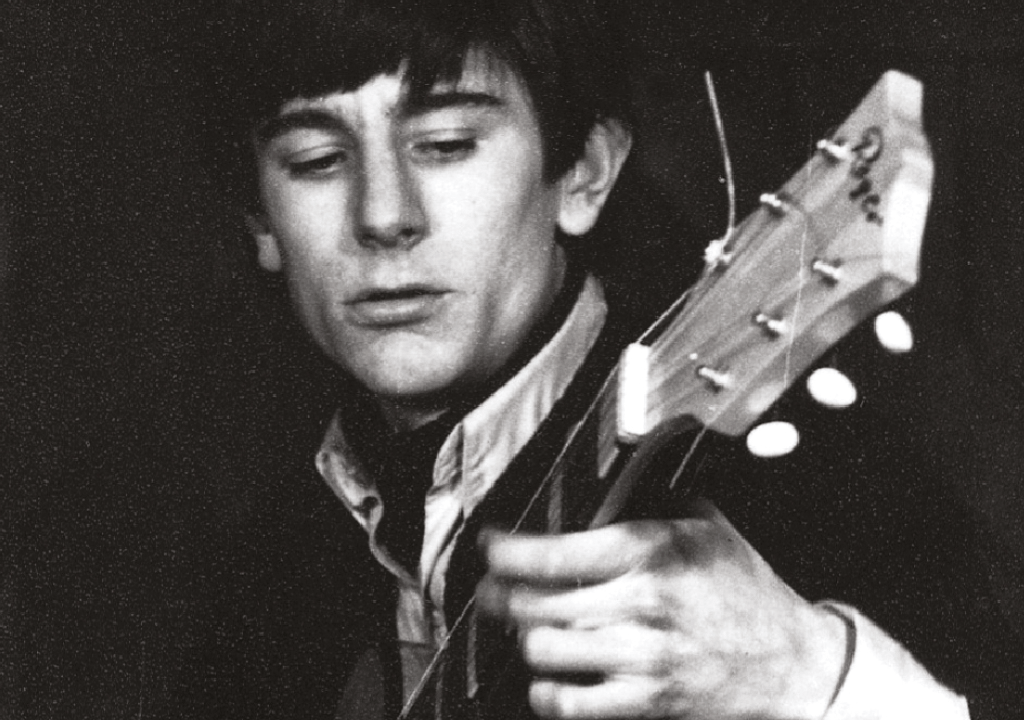
Above: young Ron living the dream.
Some nights, Wood was on stage, other times he was a face in the crowd. “There used to be waves of new people,” he explains. “Different bands setting a precedent. I remember first seeing The Who, first seeing The Move, first seeing a black American blues artist, and the Tamla Motown Revue, which came over with people like Stevie Wonder. Just amazing.”
You were listening to the blues at home, too, weren’t you?
“Yeah. People imported the records. My brother, Ted, was more into traditional jazz, so I’d get Jelly Roll Morton and Louis Armstrong from him. But Art was my more blues and souly brother, and he brought me Fats Domino’s I’m Walkin’, Smokestack Lightning from Howlin’ Wolf, Shame Shame Shame from Jimmy Reed. Then I’d go off and discover stuff myself – all my Bo Diddley, all my Chuck Berry.
“Art introduced me to Muddy Waters too. And he was also playing with a fabulous English interpretation of the blues, Blues Incorporated, which was Alexis Korner and the best harmonica player, Cyril Davies. When I was in short pants, I’d go and see this lot play, with Nicky Hopkins on piano. It was fabulous to end up playing with him in The Jeff Beck Group and the Stones. It’s just this great circle that comes around.”
Band-hopping was rife in ’65: one memorable entry from February finds Wood invited on stage with The Yardbirds. “They used to play at the Crawdaddy in Richmond, and I’d go there quite often,” remembers the guitarist. “One week, Keith Relf was ill and they made an announcement over the microphone: ‘Anyone in the audience play harmonica?’ All of my friends pushed me to the front of the stage, and I was suddenly playing I’m A Man, my favourite song. I knew all the moves and the cues. I played a few songs, up there with The Yardbirds, and then Eric Clapton sent out into the audience afterwards, saying, ‘Go and get that guy who looks like Cleopatra!’”
Wood chuckles: “We really hit it off after that. Early on, Eric was going out with Krissy, who ended up being my girlfriend, my first wife and the mother of my son, Jesse. I used to be in the audience at the Crawdaddy, standing next to Eric while I was getting off with Krissy. And he’d be like, ‘Oi! Get your hands off my bird!’ And I’d be like, ‘Sod off!’”
Clapton was just one of a cast of thousands. “I remember going up to Roger Daltrey’s flat in Gloucester Place,” laughs Wood, “and him saying, ‘One of my secrets is that I wash my hair in beer’. I knew Sharon Osbourne when she was a little baby, and I’m sure I changed her nappies. Me and Jeff Beck first met at the Sheffield Mojo, and we sort of earmarked each other’s cards, like, ‘One day, if we can ever get together, we will’. Lemmy would show up from time-to-time, too. He always had a weak spot for The Birds. I saw him just a few months ago in LA with Slash, actually, and he brought up The Birds, and was saying how influenced he was. There were a few people who were. But you can count them on both hands.”
Still, the band were sufficiently well regarded to sign with Decca. “At that time,” remembers Wood, “everyone used to meet at the record company Christmas parties. And that was amazing, because of the energy between the bands, especially the ones who were doing well. You’d go up to Warner and The Beatles or Stones would come in. There’d be Cliff Richard over here, Cilla Black over there. Then there would be all this mad staggering, and you’d move on to the next party, an Immediate party, maybe, with the Small Faces.
“You used to end up walking the streets with Viv Prince, the drummer from The Pretty Things,” Wood reflects. “And if you were doing that, you’d know you were scraping the barrel. Then you’d hang out with Keith Moon, and you were scraping another kind of barrel. It was hard to keep up with him. You’d be like, ‘Keith! You were meant to take one of those pills – not the whole bottle!’ I got fed up with saying that to him.
“Keith’s girlfriend used to lock him in a room, to keep him safe and keep him from going out. But he’d always find a way. He’d go out of the window, down the drainpipe, jump onto the dustbin, then go and rave in a club and get back in the same way he left – and then behave like nothing had happened when she opened the door. ‘See, he’s still there,’ she used to say.”
As the diary attests, Wood himself was no puritan. On April 11, his shaky entry gleefully admits that he “got sloshed and spewed muchly”. The guitarist grins: “Oh yeah. There’s another entry where it says, ‘Great night last night – sick twice’. There were early signs in The Birds, of the raucous behaviour to come in the Faces. I was experimenting with different kinds of whisky, which didn’t really suit me. Brandy and Coke was another early choice. And then, by the time I got to the Faces and The Jeff Beck Group, it was port and brandy for me, Rod and Jeff, as a stiffener before you went on stage.
“But I’d always sobered up by the time I wrote in the diary,” he reminds us, mock-innocent. “I was very conscientious. Much as I am today.”
If Wood’s lifestyle circa ’65 seems like that of the bona fide rock star, he assures us the till receipts didn’t bear it out. “After the expense of the petrol and the digs – or we’d sleep in the van – I suppose we made a fiver each if we went out for 50 quid. That was more or less a good day. I was still living at home, so I’d give my mum a few quid each week towards the housekeeping. There was hardship, but it would bounce off us because we were young. I think, rather than the money and all that, we were just striving for musical progression and experimentation, trying things out on stage.”/o:p
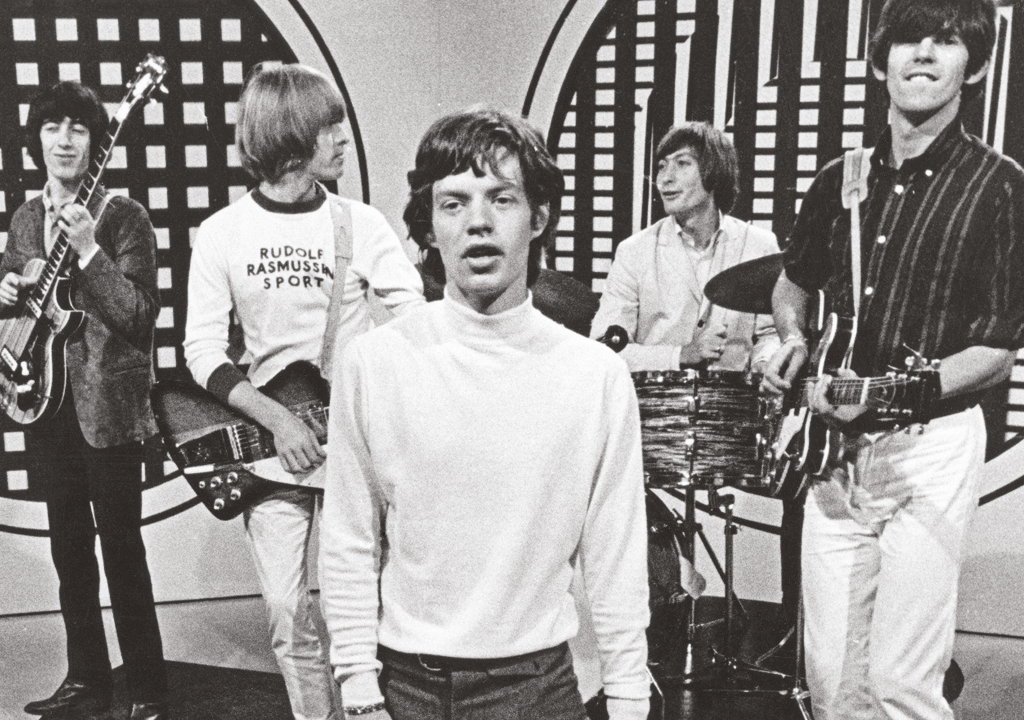
Above: Wood’s contemporaries and future gang, The Rolling Stones.
One refreshing aspect of the diary is that Wood doesn’t bother with diplomacy, often describing rival bands as “also-rans” and provincial venues as “holes” and “dumps”. He nods: “Yeah. Or maybe I’d write something like, ‘The audience tonight were a bunch of cretins and wallflowers’. I stand by what I said then, because I knew no more. There were a lot of dumps. I’ve chosen to forget some of the working men’s clubs, but unfortunately, I still remember a lot of them. If they didn’t like you in Scotland, you’d get bottles thrown at you. We didn’t get showered, like lots of bands would get.
“But then,” he adds, “it was Beatlemania for us down in Salisbury. We were on bills with The Troggs, and Dave Dee, Dozy, Beaky, Mick And Tich – and they were really big. Although we weren’t known anywhere else, Salisbury adopted us as their band, and they used to want pieces of you and your clothing. They’d come at you with scissors. It was really frightening. The girls were really after your blood. The screaming… it was quite threatening. It was enjoyable in retrospect.”
The screaming wouldn’t last long for The Birds. After a volley of classy early singles, the band hit the headlines for the wrong reasons that August, ambushing The Byrds as they touched down at London Airport and serving their US namesakes with a writ over the contested avian monicker. Even now, Wood squirms a little, pinning the incident on Birds manager Leo De Clerck: “Oh, it was very embarrassing. But our manager got us on the front page of the Melody Maker for doing that. I’ve made up with Roger McGuinn, yeah.”
That flash of publicity couldn’t sustain them. Late in ’65, The Birds moved to the Reaction label, where Robert Stigwood lumbered them with the pitiful new title, The Birds Birds. By ’67, it was all over, Wood picking up the bass for The Jeff Beck Group and setting off for rock immortality. Today, he dismisses the kindly notion that The Birds were potential world-beaters who just needed a lucky break.
“We were just going through a learning curve. Young boys, acting as if we were famous, y’know? The Birds were a good band to cut your teeth on. But we didn’t really have the staying power, members-wise. They weren’t all cut out to survive the course.”
Indeed, most of The Birds line-up are gone now, with the exception of vocalist Ali McKenzie. “Ali is still a good pal of mine,” beams Wood. “He never gave up being a glazier. He’s also found a lot of posters and flyers to accompany the actual dates in the diary. So if we were in Southsea, you’ll have the poster from the gig. So Genesis really are reproducing this diary as near as dammit.”
Wood is patently fond of this knackered old book. That’s understandable. Recently discovered at the back of a drawer in his mother’s house, it’s a wormhole to his youth, and to old friends now sadly departed. “Fifty years ago,” he murmurs, thumbing page after page of his spidery, apostrophe-free handwriting. “But it’s like no time has gone by. It was a very pleasing thing for me to rediscover this. It was, like, ‘Wow, I remember’. All of the places, the names, the situations, I remember crystal clear, like it was yesterday. Yeah, lots of them are gone now. Dropping like flies, everywhere.”
To those who know Wood best as the chaotic wingman to Keith Richards’ cackling human riff, the guitarist might not seem an obvious diarist in the mould of a Tony Benn, an Alan Clark or even an Adrian Mole. With How Can It Be?, the revelation is that he might just be a natural. “Oh, I would love to be a writer, yeah,” he concludes. “Never had the time to get round to it, but I’ve almost embarked a few times. I’ve written the first few pages to books. Maybe they’ll turn up. Just like this diary did.”/o:p
How Can It Be? A Rock & Roll Diary is published by Genesis. Choose between Deluxe version (£495) and Collector’s version (£295), both available now as limited editions. The hardback version follows in September (circa £30). See www.ronniewood.com for details./o:p
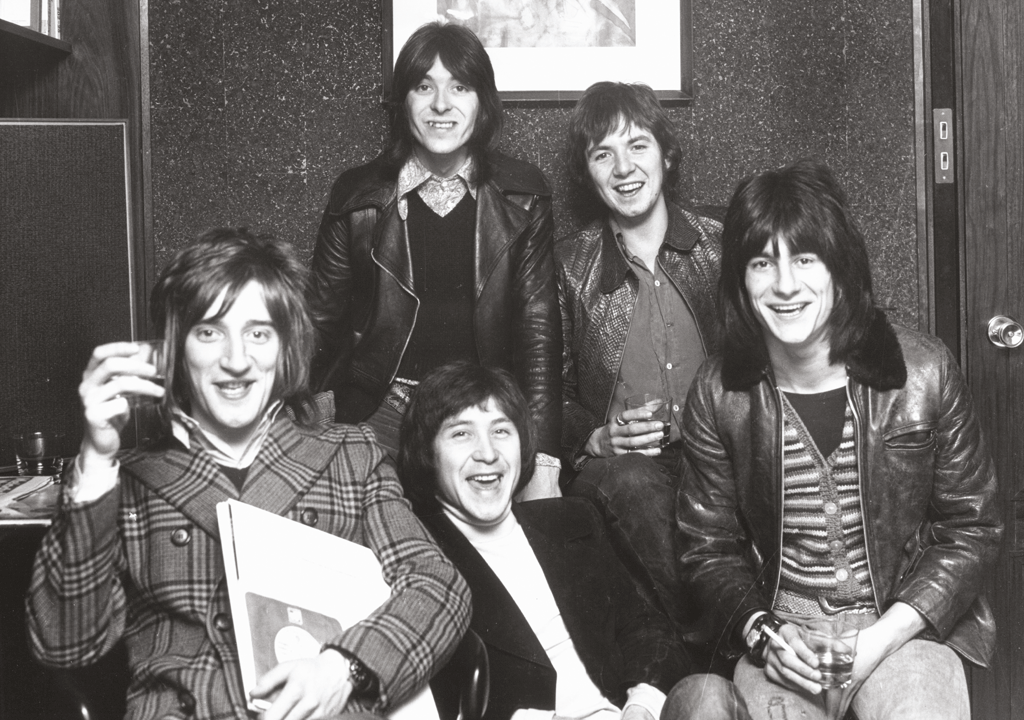
On A Roll
How Woody went from Birds to Stones in just 10 years…
Most musicians strive to be in just one iconic band. Ronnie Wood has been in three. Following his time in The Birds, he briefly joined The Creation. “After Eddie Phillips left,” he said in 2008, “they told me I had to fill his shoes, play with a violin bow and also paint on this big canvas during the songs. We were so big in Germany that Diana Ross and The Supremes were second on the bill. It blew me away. Suddenly you’re famous, but only in one country!”
The more significant juncture came when Wood hooked up with his old mates in The Jeff Beck Group, playing bass on the heavy blues of 1968’s Truth album. And his upward trajectory continued late in 1969, when he and Beck Group vocalist Rod Stewart joined the travelling piss-up that was the Faces [pictured above]. “We’d all buy the latest camera that came out, Super 8s and whatever,” Wood said. “We’d all be filming each other at airports, in cars, backstage and with the groupies in the rooms, y’know? There’s some hilarious footage.”
Wood once noted that he felt like a Rolling Stone even before he was one (“I could picture myself being in that band. It was definitely an ambition”). By 1975, the fantasy had come to pass. When asked for the qualities it took to play in that line-up, Wood was emphatic: “Well, you’d better not fuck up. That’ll get you fucked up. You just have to work with the push and pull. It was something I felt right from the start. I was in tune and on the wavelength of their music, so when it came to playing with them, it was like a jigsaw fitting into place. Me and Keith [Richards] just hit it off straight away. I first met him when my first wife brought him home from Tramp. He came over for the night and stayed four months. Then we went into the studio and just started speaking through our guitars.”
Since coming aboard, Wood has earned writing credits on a fistful of Stones songs — no small achievement given the stranglehold of Mick ‘n’ Keef. “Yeah, the old Jagger/Richards closed shop,” he told us. “But if I believe enough in a song of mine then it’ll be used, like with Dance or Hey Negrita. But they drive a pretty hard ship, y’know, with the quality of their songs. You’ve got to go some to keep that standard up.”
Even now, at 68, Wood shows no sign of fatigue (as this issue goes to press, he is on the Stones’ Zip Code stadium tour of North America). “There’s still the hunger,” he said in that same 2008 interview. “When you think about it, rock‘n’roll has only been going for 50 years or something. You have to keep going. You owe it to music and to the people.”
